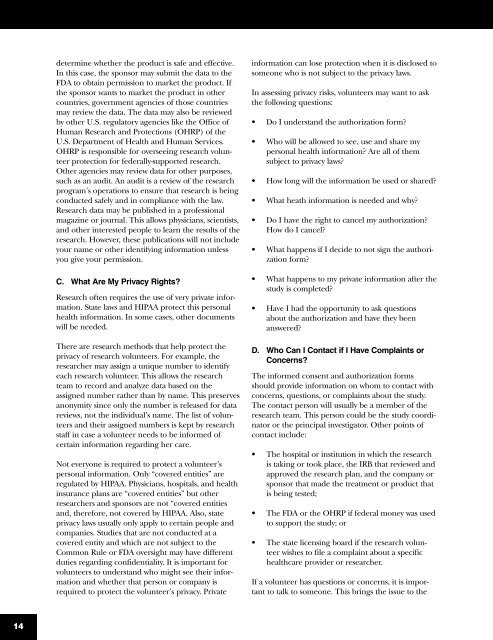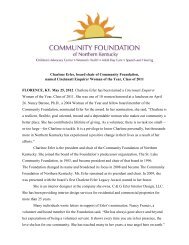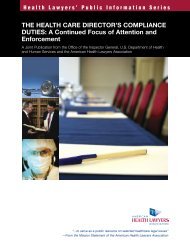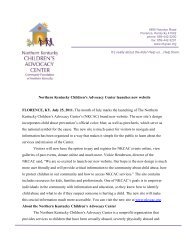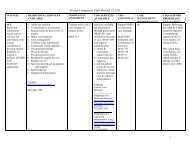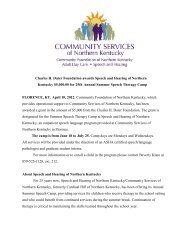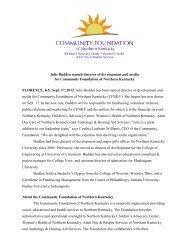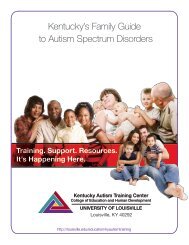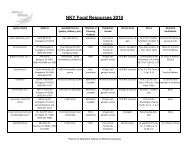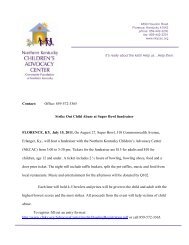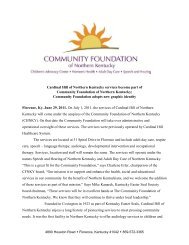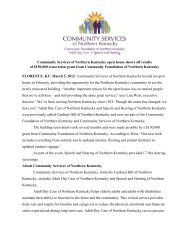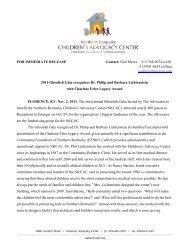Medical Research: A Consumer's Guide for Participation
Medical Research: A Consumer's Guide for Participation
Medical Research: A Consumer's Guide for Participation
You also want an ePaper? Increase the reach of your titles
YUMPU automatically turns print PDFs into web optimized ePapers that Google loves.
determine whether the product is safe and effective.<br />
In this case, the sponsor may submit the data to the<br />
FDA to obtain permission to market the product. If<br />
the sponsor wants to market the product in other<br />
countries, government agencies of those countries<br />
may review the data. The data may also be reviewed<br />
by other U.S. regulatory agencies like the Office of<br />
Human <strong>Research</strong> and Protections (OHRP) of the<br />
U.S. Department of Health and Human Services.<br />
OHRP is responsible <strong>for</strong> overseeing research volunteer<br />
protection <strong>for</strong> federally-supported research.<br />
Other agencies may review data <strong>for</strong> other purposes,<br />
such as an audit. An audit is a review of the research<br />
program’s operations to ensure that research is being<br />
conducted safely and in compliance with the law.<br />
<strong>Research</strong> data may be published in a professional<br />
magazine or journal. This allows physicians, scientists,<br />
and other interested people to learn the results of the<br />
research. However, these publications will not include<br />
your name or other identifying in<strong>for</strong>mation unless<br />
you give your permission.<br />
C. What Are My Privacy Rights?<br />
<strong>Research</strong> often requires the use of very private in<strong>for</strong>mation.<br />
State laws and HIPAA protect this personal<br />
health in<strong>for</strong>mation. In some cases, other documents<br />
will be needed.<br />
There are research methods that help protect the<br />
privacy of research volunteers. For example, the<br />
researcher may assign a unique number to identify<br />
each research volunteer. This allows the research<br />
team to record and analyze data based on the<br />
assigned number rather than by name. This preserves<br />
anonymity since only the number is released <strong>for</strong> data<br />
reviews, not the individual’s name. The list of volunteers<br />
and their assigned numbers is kept by research<br />
staff in case a volunteer needs to be in<strong>for</strong>med of<br />
certain in<strong>for</strong>mation regarding her care.<br />
Not everyone is required to protect a volunteer’s<br />
personal in<strong>for</strong>mation. Only “covered entities” are<br />
regulated by HIPAA. Physicians, hospitals, and health<br />
insurance plans are “covered entities” but other<br />
researchers and sponsors are not “covered entities<br />
and, there<strong>for</strong>e, not covered by HIPAA. Also, state<br />
privacy laws usually only apply to certain people and<br />
companies. Studies that are not conducted at a<br />
covered entity and which are not subject to the<br />
Common Rule or FDA oversight may have different<br />
duties regarding confidentiality. It is important <strong>for</strong><br />
volunteers to understand who might see their in<strong>for</strong>mation<br />
and whether that person or company is<br />
required to protect the volunteer’s privacy. Private<br />
in<strong>for</strong>mation can lose protection when it is disclosed to<br />
someone who is not subject to the privacy laws.<br />
In assessing privacy risks, volunteers may want to ask<br />
the following questions:<br />
• Do I understand the authorization <strong>for</strong>m?<br />
• Who will be allowed to see, use and share my<br />
personal health in<strong>for</strong>mation? Are all of them<br />
subject to privacy laws?<br />
• How long will the in<strong>for</strong>mation be used or shared?<br />
• What heath in<strong>for</strong>mation is needed and why?<br />
• Do I have the right to cancel my authorization?<br />
How do I cancel?<br />
• What happens if I decide to not sign the authorization<br />
<strong>for</strong>m?<br />
• What happens to my private in<strong>for</strong>mation after the<br />
study is completed?<br />
• Have I had the opportunity to ask questions<br />
about the authorization and have they been<br />
answered?<br />
D. Who Can I Contact if I Have Complaints or<br />
Concerns?<br />
The in<strong>for</strong>med consent and authorization <strong>for</strong>ms<br />
should provide in<strong>for</strong>mation on whom to contact with<br />
concerns, questions, or complaints about the study.<br />
The contact person will usually be a member of the<br />
research team. This person could be the study coordinator<br />
or the principal investigator. Other points of<br />
contact include:<br />
• The hospital or institution in which the research<br />
is taking or took place, the IRB that reviewed and<br />
approved the research plan, and the company or<br />
sponsor that made the treatment or product that<br />
is being tested;<br />
• The FDA or the OHRP if federal money was used<br />
to support the study; or<br />
• The state licensing board if the research volunteer<br />
wishes to file a complaint about a specific<br />
healthcare provider or researcher.<br />
If a volunteer has questions or concerns, it is important<br />
to talk to someone. This brings the issue to the<br />
14


